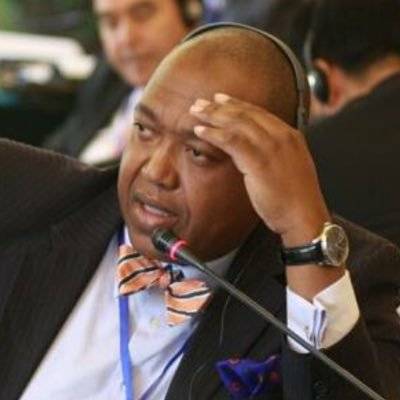Abqaiq petroleum processing facilities and Khurais oil field in Saudi Arabia were attacked by a multitude of missiles and rockets last Saturday. Saudi Arabia has said Iran was behind the attacks and has used the incidence to garner empathy from the world, saying the attacks were against the “international community” as it stands to disturb global oil supplies and economies.
The kingdom claims that half of its oil output comes from Abqaiq and Khurais; adding in the same breath that it will tap into reserves to make up for the shortfall. Saudi Arabia has also made assurances that the production at Abqaiq and Khurais will be back to normal by the end of September.
On Tuesday, the spokesperson of the Saudi Defense Ministry Colonel Turki Al-Malki invited international journalists, diplomats and Saudi based social commentators to a presentation in Riyadh. He presented weapons debris as evidence that indeed the rockets and missiles originated from Iran. Speaking in English throughout, Al-Malki insisted that Iran was the culprit, however when probed for an answer by CNN’s Nick Robinson whether it was Iran that had launched the attacks, Al-Malki ignored the question. Robinson repeated his question twice “was it Iran?” the spokesperson dismissed it both times and moved onto another question.
READ: Houthis carried out attack on Saudi Arabia, not us
This was perhaps the most important part of the presentation. It basically answered an important question i.e. Saudi Arabia cannot confirm where the rockets were launched from. The inability to confirm this important fact gives some credence to claims by the Houthi fighters in Yemen that they had indeed launched the attacks. After all, they’ve previously been able to launch devastating attacks inside Saudi Arabia. Euronews reported on 26 July “Yemen’s Houthi movement launched an attack on Abha civilian airport in southern Saudi Arabia on Sunday that killed one person and wounded seven others”.Why is the world, particularly the US, skeptical that this time around the Houthis executed this attack? Furthermore, given previous incidences and evidence, why is it surprising that the weapons used in this attack originated from Iran? After all, Iran has been very open in its articulation of military support of the Houthis. According to the Intercept: “Last summer Israel shot down yet another military drone near the line that separates the Israeli-occupied Golan Heights from the rest of Syria. Images of the destroyed drone showed Cyrillic tail markings and other identifiable components of a Forpost belonging to Russia. The findings presented an awkward geopolitical moment: Syria and Russia are allies, and Syria and Israel are bitter enemies — but the Russian Forpost shot down by Israel was designed in Israel itself.” This is the business of war, weapons are provided to “allies and foes” depending who is the highest bidder. It is perhaps correct as earlier stated that the weapons were sponsored and provided by Iran but it still does not prove Iran launched the missiles and rockets into Saudi Arabia.
READ: Trump says he has ordered ‘substantial increase’ of Iran sanctions
The Houthi rebels have over the past couple of months escalated the attacks on Saudi positions and have claimed those attacks. They have insisted that the attacks are in retaliation of the continual bombardment of their assets and fighters in Yemen. The Saudi-led coalition has been engaged in the bombardment of Houthi positions in Yemen since 2015.
The Houthis held their own press conference in Sanaa, Yemen, on Tuesday, insisting it was they who hit Abqaiq and Khurais and vowed to continue with similar attacks in the future. If the Houthis indeed launched these attacks why is Saudi Arabia insisting it was Iran? First, Saudi Arabia seeks to take the attention from Houthis in order to minimise the confidence their fighters who could be emboldened by the recent attack. It is also trying to save itself from embarrassment; notwithstanding its multi-trillion dollar military spending the country still cannot protect its assets and people from the Houthis. According to the Guardian newspaper: “The audacious strike against the Abqaiq petroleum processing facilities and Khurais oil field on Saturday morning – which the Saudis say was “ unquestionably sponsored by Iran” – has exposed the limits of the defenses of the world’s largest military spender per capita”.Saudi Arabia is also seeking to put pressure on US President Donald Trump not to initiate any discussion with Iran. The attacks could not have come at a better time for Saudi Arabia. There are reports that the President of Iran Hassan Rouhani and Donald Trump could meet along the sidelines of the United Nations General Assembly (UNGA) later next week. Normalisation of Iran could prove challenging for Saudi Arabia for various reasons; it could result in additional oil into the market and that could reduce the price of oil drastically. It could also mean more money for Iran resulting in additional ability for Tehran to fund its political projects in the Middle East including the Houthi fighters in Yemen.
READ: Amnesty warns Saudi not to retaliate following strike on oil facility
The views expressed in this article belong to the author and do not necessarily reflect the editorial policy of Middle East Monitor.

![US President Donald Trump in the Oval Office in Washington, DC on 13 May 2019 [Mark Wilson/Getty Images]](https://i0.wp.com/www.middleeastmonitor.com/wp-content/uploads/2019/05/GettyImages-1148899673-e1558716816640.jpg?fit=920%2C614&ssl=1)

![Trump's threats to Iran - Cartoon [Arabia21]](https://i0.wp.com/www.middleeastmonitor.com/wp-content/uploads/2019/06/Iran-Trump.jpg?resize=500%2C326&ssl=1)







